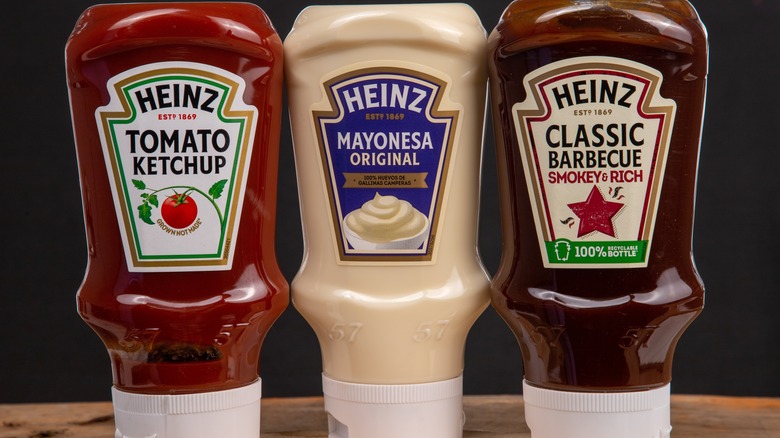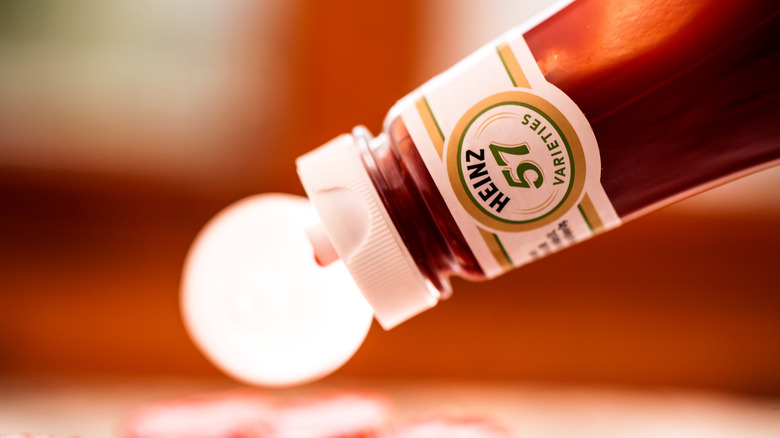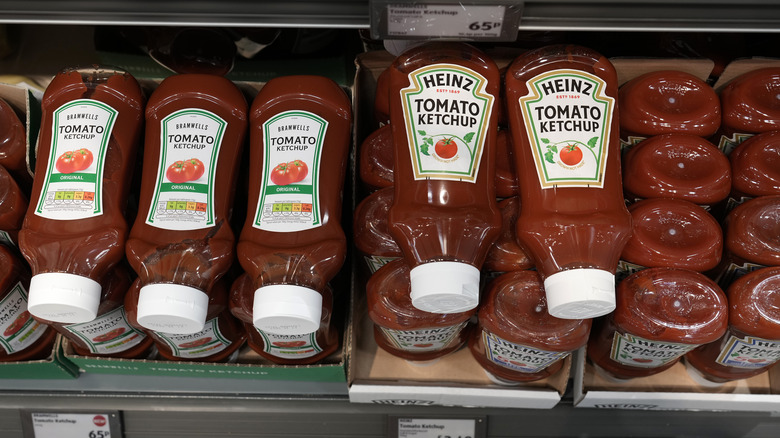Why Ketchup Bottles Used To Explode A Lot More Often
Imagine that you're sitting in a restaurant, casually eating your meal, when, all of a sudden, the bottle of Heinz sitting next to the salt and pepper shaker just explodes. Literally, straight-up explodes out of nowhere. As you're sitting there, wiping globs of ketchup off your face and clothes, your face streaked in red as if you just got done performing in a horror movie, you have to wonder: What just happened?
Ketchup has been around for many years, with HISTORY reporting that a very early version of ketchup made out of fish guts and meat by-products was a condiment in Imperial China. It wasn't until 1812 that Philadelphia horticulturalist James Mease published the first tomato-based recipe for "catsup" (via NPR). In fact, ketchup is surprisingly easy to make, using only tomatoes, brown sugar, vinegar, and different spices like onion, ginger, and allspice to make a pretty good condiment to dunk your fries in, Food Network explains. But whether it's fish guts or crushed tomatoes, you probably can't see anything that would, you know, turn a bottle of ketchup into a ticking time bomb.
How could something as basic as crushed vegetable puree be made into something that used to explode in people's faces? Was there some kind of "secret ingredient" in early twentieth-century ketchup that is now banned today, or was it some sort of natural reaction caused by the bottling process?
Ketchup bottles would explode due to fermentation
When you think of fermentation, you most likely think of the brewing process behind a beer or making a loaf of bread. Truth be told, ketchup was more often fermented, in which all ingredients were mixed into a jar and allowed to sit out for some time. But what does fermenting some ketchup have to do with it exploding?
According to Atlas Obscura, although fermented ketchup appealed to Americans in the late nineteenth and the early twentieth century because of its long shelf life, fermentation triggered a natural chemical reaction. As the chemicals inside the jar or bottle broke down, they would begin to build up pressure inside the jar. The pressure also increased as ketchup bottles would be left out at room temperature, exposing them to potential heat sources like direct sunlight. Once the pressure reached a breaking point, the glass bottle or jar would explode — sometimes with incredibly deadly force.
This wasn't the only reason ketchup became increasingly dangerous to the consumer. According to Prescott eNews, certain kinds of ketchup were fermented and put in colored glass bottles. This meant that manufacturers could put expired or rancid ketchup in these bottles, and the consumer, who wouldn't see what's inside, would be none the wiser. This, however, came to an end when companies such as Heinz moved to add chemical preservatives into their ketchup to help ensure a longer shelf life.
Exploding ketchup may also be a sign of counterfeit ketchup
You most likely think that "exploding ketchup bottles" was another quirky part of the early 1900s, like the Charleston or the Model T. But, while a very rare case, exploding bottles of ketchup have also happened in the twenty-first century. In fact, some even say that, should your bottle of ketchup explode while in your fridge, there's a chance you got duped with counterfeit ketchup.
In 2012, Yahoo! News delivered a bizarre report: ketchup bottles were exploding off supermarket shelves in New Jersey. Before you write of exploding ketchup as "just a Jersey thing," Yahoo! News explains that this was a clear sign of counterfeit products. This meant that a group of individuals would purchase bulk amounts of ordinary Heinz ketchup, transfer the ketchup into bottles advertising a more expensive Heinz product, and then sell this "fancy ketchup" at a high price. The reason behind the bottles of "counterfeit catsup" exploding was simple: the bottles were not "sterilized" before being sent out, as introducing the bottled product to heat helps to kill pressure-building microbes.
Although some concern was expressed that the counterfeit Heinz may have been tainted during their transfer from bottle to bottle, per New Jersey.com, it seems that the only harm the counterfeit operation did was just make a mess for some grocery store workers to clean.


